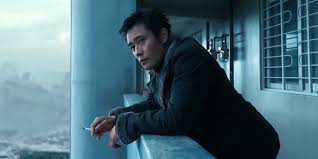Eye For Film >> Movies >> Concrete Utopia (2023) Film Review
Concrete Utopia
Reviewed by: Jennie Kermode

“I want to keep moving to bigger units and keep up this apartment lifestyle,” a woman says in the black and white ‘documentary’ which opens South Korea’s submission to the 2024 Oscars. Viewers may think of its 2020 winner, Parasite, and indeed, there are themes in common between the two, but Um Tae-hwa’s work has one marked difference: shortly after the main narrative begins, almost everybody in the world is killed.
We don’t know exactly what happened. Why would we? There are hints, and we see the city shudder, rubble falling everywhere. Somehow, the Hwang Gung apartment building remains standing. A crowd of refugees assembles outside it. It’s icy cold, they have no shelter and don’t know where to get food. As they beg for admittance, the head of the Hwang Gung Women’s Committee gets the residents together inside. What should they do? Some of them protest that the only answer is to be humane. To shut people out is to sentence them to death. Others reason that they only have so much food and might not be able to get more, so to bring in the refugees would be suicide.

This is just the start of a series of debates which will reshape the residents’ lives and narrow their thinking in a way that goes far beyond what is necessary for survival (if, indeed, there is any realistic prospect of survival in the long term). Though initially reluctant, Kim Yeong-tak (Lee Byung-hun) is elected as leader because he previously led everyone in a campaign against redevelopment, whilst a still more uncomfortable Min-sung (Park Seo-joon) is made head of the Anti-Crime Taskforce. “Shouldn’t the leaders all be homeowners?” someone asks, and it’s easy to see where this is going. A man left outside in the cold protests that he has worked there for 20 years, but class has never mattered more than it does now.
Time passes and new systems evolve in a way which bears some similarities to High-Rise but with a distinctly Korean flavour and some very specific satirical points. Much of the action is seen from the point of view of Min-sung’s young wife, Myung-hwa (Park Bo-young), whose tender-heartedness initially seems like a poor survival trait but who gradually emerges as one of few people in the building who is able to retain something of her original perspective, a quality which becomes important as dwindling resources persuade Yeong-tak to adopt incrementally more extreme tactics, and as old secrets gradually come to the fore. It is obvious that the situation cannot endure, and yet when it eventually gives, Um manages to deliver an ending which will leave many viewers feeling as if the rug has been pulled out from under them yet again.
Many people will be attracted to this film because of the spectacle it presents. The landscape of ruined buildings is magnificently constructed and shot, with an alertness to the visual metaphors it offers as well as the tactical opportunities it creates for factions of survivors. It’s a visually inventive and continually intriguing place, offering far more than the familiar rubble-strewn landscapes of most post-apocalyptic science fiction. This is appropriate because Um is interested in how such landscapes seduce us into particular ways of thinking and, indeed, how apt we are to look to such films for inspiration when the familiar logic of the everyday no longer suffices – whether or not it’s really a good idea.
There are no weak links amongst the actors here, but it is Lee who stands out, immersing himself in the complex character of a man who has elements of both hero and villain, caught in a situation which leaves no room for him to acknowledge himself as a flawed human being in need of help. Indeed, it’s implied that he has been in that situation for some time before the disaster, but the new order of things makes his weakness look like strength, encouraging him to distort what he tells himself as much as anyone else. By contrast, Min-sung and Myung-hwa are quite conventional leads, with simple motives and easily relatable values, yet their embrace of their own helplessness, the ease with which they surrender power is not something for which Um ever really lets them off the hook.
A smart, timely, morally challenging film disguised as an entertaining blockbuster, Concrete Utopia looks likely to make an impact far beyond its native shores.
Reviewed on: 03 Dec 2023

















